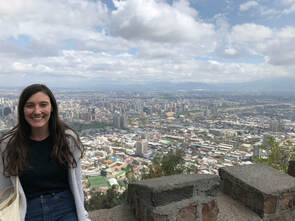
I will soon be finishing my first year in grad school. I managed to live by myself in a different state without burning my house down or giving myself food poisoning. It’s definitely been an interesting journey settling into my Ph.D. program, so I thought I'd share some lessons I've learned in my first year.
Keep contact back home
You will get homesick. Even when you talk to your parents at least once a day, as I do, you will get homesick, trust me. If it's not something you haven't experienced before, you won't know what you're feeling when it first hits you. It will feel awful, but it's normal to feel this way, especially if it’s the first time you’re away from home, like me. It helps to talk to someone who's already been through it. I talked with a friend who had gone to grad school the year before and he helped me identify that it was homesickness I was feeling. Cry if you feel the need to. And most importantly, connect with your family. Even if you are out on your own, that doesn't mean you are alone. Your family misses you too, so they will be more than happy to hear from you.
Homesickness will be something that comes and goes, but it’s easier to deal with when you know what it is you’re feeling. Contact your family as often as you need to. There are no set rules that limit or dictate how you connect to your family. Funnily enough, I feel more connected to my parents now that I’m actually away from home. We now talk more than ever before! My mom has also become one of those WhatsApp moms that sends an encouraging poem every day, and I've learned to look forward to them every single day.
Don't compare yourself to others
The thing about grad school is that everybody here is conventionally smart. Coming into grad school, you may be shocked that you are no longer the “smart one” of your group. It's easy to fall into the trap of imposter syndrome and feel like you're one sentence away from being discovered and getting kicked out of grad school. However, you have to keep in mind that everybody’s research is different, they all have different goals, and it's normal to be moving at different paces, so it doesn't make any sense to compare yourself to fellow graduate students.
The importance of accountability
For me, grad school has been an exercise in adulting. I knew I could keep up with classes relatively well, but I wasn't prepared for the sudden loss of the routine I learned to keep during undergrad. Grad school keeps you busy, but it also creates more free time than you know what to do with. It was easy for me to get lulled into a false sense of security that I had plenty of time to finish everything I needed to get done.
You can have a life in grad school if you plan accordingly. There won't be anyone assigned to keep an eye on you specifically. Remember you are a grown up and you have to be responsible for yourself -- after all, you chose to apply to grad school, so now you have to do the work. However, that doesn't mean that you can’t have a little help. Depending on your work style, you might be more comfortable scheduling time where you and a group of friends work together, say in a coffee shop or in someone’s home. Some people like setting up deadlines for themselves, usually before an actual assignment is due. Others recommend getting an accountability buddy. You know yourself best, so if you feel that something works for you, go for it.
Make friends outside of your program and discipline
Grad school is great because you get to meet like-minded peers. However, you have to remember that there is more to grad school and to life outside of your program. I know sometimes it becomes easy for grad students to stay within their program or department, as they often don't need to go elsewhere on campus to get what they need, and I have to admit I'm also somewhat guilty of this. But I've also learned to take advantage of the, very often free, events on campus, which usually also have free food, a topic I will touch on later as well. This way you get to do something fun (as defined by you) and you get to meet other students outside of your discipline. I especially like meeting other grad students outside of psychology, because I get to learn about other cool topics as well. For example, hyenas!
Go for the free food, stay for the talk
People will often make jokes about grad students and free food and these jokes are not completely unfounded. I've certainly gone to events where my first question was “Will there be food?” instead of “What is this event about?” But honestly, who hasn't done the same? Even if this is the method you use to decide what events you go to, you can actually learn a lot of cool things once you're there. Because I was promised free food, I've gone to job talks, brown bags, and union meetings, among other events. Apart from good food, I have also learned about the university hiring process, gotten the break down of the application of cool methods, and participated in union strategizing, just to mention a few things. So, go for the free food, but stay for the talk.
These are just some of the things I’ve learned during my short time in grad school, but I'm sure I still have many more lessons to learn and I'm excited to see what those lessons will be.

